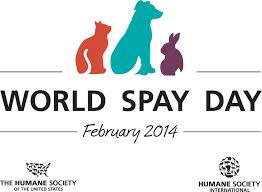
~~February 25, 2014~~
|
Every year, millions of companion animals suffer and die in the United States
and around the world. Be a part of the solution and promote spay/neuter! |
|||
 |
|||
|
~~Spay Day USA~~


~~RELATED~~
http://www.humanesociety.org/issues/spay_day/#.Uwz_j_ldVqk
http://santafescoop.ning.com/profiles/blogs/tomorrow-is-national-spay-day
Neutering, from the Latin neuter (of neither sex), is the removal of an animal’s reproductive organ, either all of it or a considerably large part. The term is often used in reference to males whereas spaying is often reserved for females. Colloquially, both terms are often referred to as fixing. While technically called castration for males, in male horses, the process is referred to as gelding.
Neutering is the most common sterilizing method in animals. In the United States, most humane societies, animal shelters and rescue groups urge pet owners to have their pets neutered to prevent the births of unwanted litters, contributing to the overpopulation of unwanted animals in the rescue system.
Modern veterinary practice tends to use the more precise and specific term “de-sexing”.

Spaying is a general term used to describe the ovariohysterectomy of a female animal. Neutering is a general term used to describe the castration of a male animal. However, neutering is often used in reference to both genders. The surgical procedure, performed by a veterinarian, renders the animal incapable of reproducing. Here are answers to some questions you may have about this beneficial procedure.
~~When can I have this procedure done?~~
Both procedures can safely be performed at as early as 8 weeks of age. American Humane Association is a strong proponent of juvenile or pediatric spay/neuter since it is both healthy for pets and effectively reduces pet overpopulation.
~~Why should I have my pet neutered?~~
Animal shelters, both public and private, are faced with an incredible burden: What to do with the overpopulation of dogs and cats that they cannot find homes for? Approximately 3.7 million animals are euthanized at shelters each year, due to the sheer fact that there are not enough willing adopters. Having your pet spayed or neutered ensures that you will not be adding to this tremendous burden.
~~What are some of the health and behavioral benefits?~~
Through neutering, you can help your dog or cat live a happier, healthier, longer life. Spaying eliminates the constant crying and nervous pacing of a female cat in heat. Spaying a female dog also eliminates the messiness associated with the heat cycle.
Neutering of male dogs and cats can prevent certain undesirable sexual behaviors, such as urine marking, humping, male aggression and the urge to roam. If you have more than one pet in your household, all the pets will generally get along better if they are neutered.
A long-term benefit of spaying and neutering is improved health for both cats and dogs. Spaying females prior to their first heat cycle nearly eliminates the risk of breast cancer and totally prevents uterine infections and uterine cancer. Neutering males prevents testicular cancer and enlargement of the prostate gland, and greatly reduces their risk for perianal tumors.
~~Full Read/Credit/Article~~
http://www.americanhumane.org/animals/adoption-pet-care/caring-for-your-pet/spaying-neutering.html
Spaying and Neutering: The Responsible Thing to Do
Published on Jun 4, 2013
By having your pet spayed or neutered, you can do your part to prevent the birth of unwanted puppies and kittens and enhance your pet’s health and quality of life.
Dr. Tony Kremer gives you the facts on why having your pet surgically sterilized is the responsible thing to do.

We ALL are ONE!!





